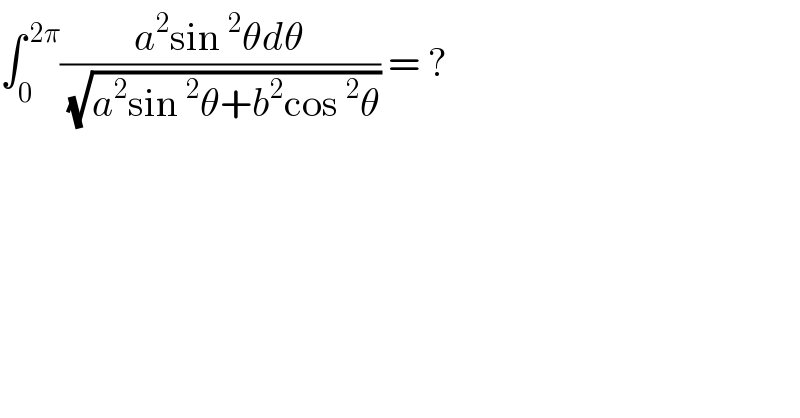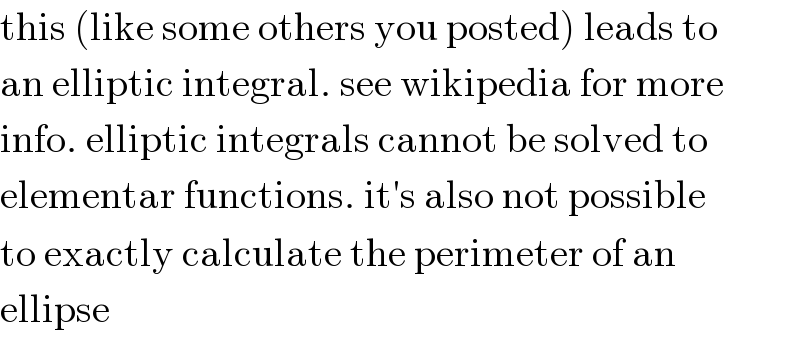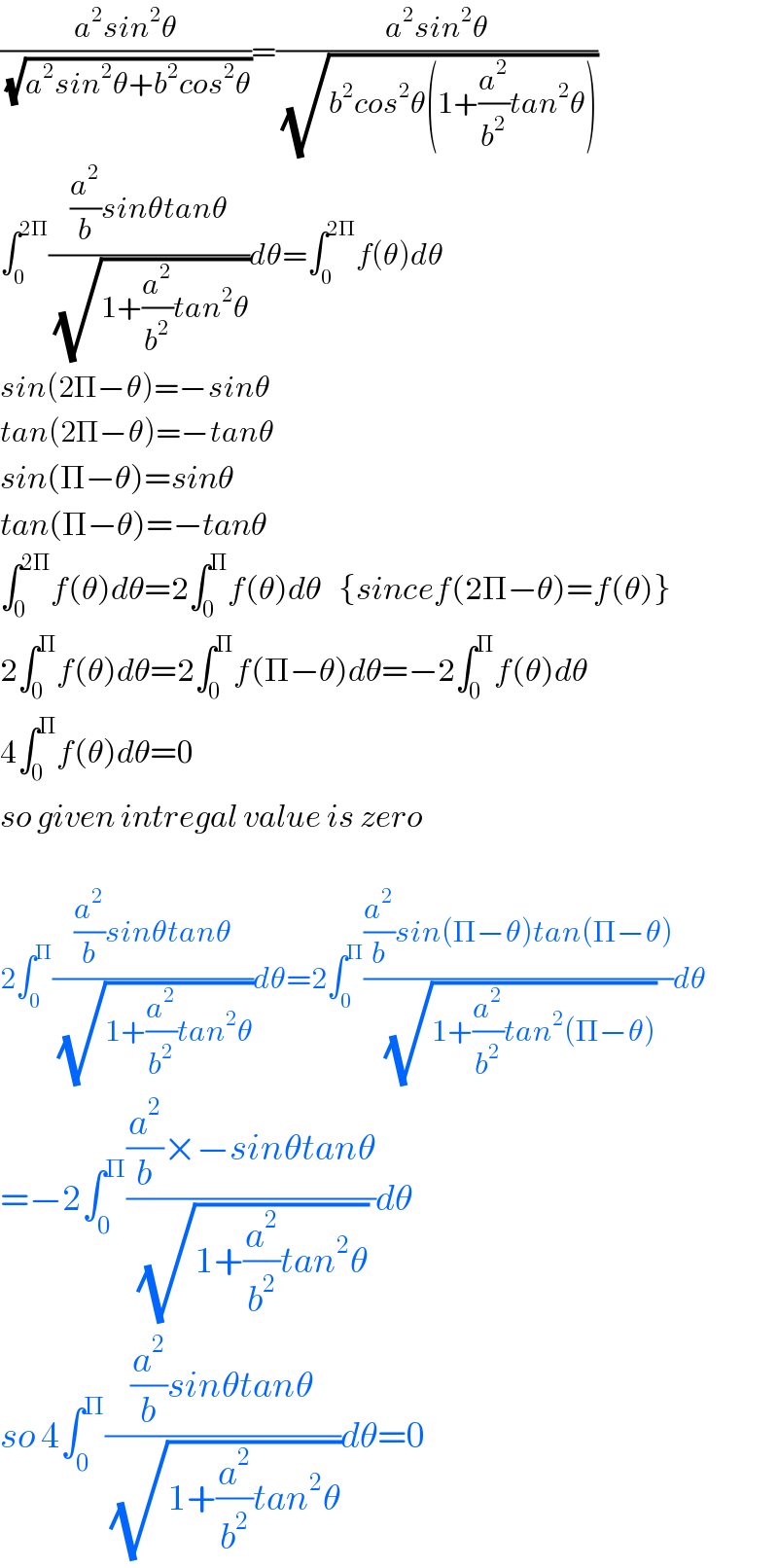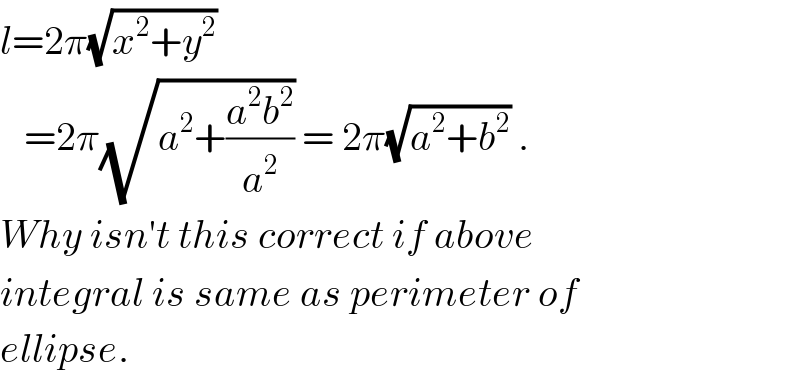Question Number 37451 by ajfour last updated on 13/Jun/18

$$\int_{\mathrm{0}} ^{\:\mathrm{2}\pi} \frac{{a}^{\mathrm{2}} \mathrm{sin}\:^{\mathrm{2}} \theta{d}\theta}{\:\sqrt{{a}^{\mathrm{2}} \mathrm{sin}\:^{\mathrm{2}} \theta+{b}^{\mathrm{2}} \mathrm{cos}\:^{\mathrm{2}} \theta}}\:=\:? \\ $$
Commented by MJS last updated on 13/Jun/18

$$\mathrm{this}\:\left(\mathrm{like}\:\mathrm{some}\:\mathrm{others}\:\mathrm{you}\:\mathrm{posted}\right)\:\mathrm{leads}\:\mathrm{to} \\ $$$$\mathrm{an}\:\mathrm{elliptic}\:\mathrm{integral}.\:\mathrm{see}\:\mathrm{wikipedia}\:\mathrm{for}\:\mathrm{more} \\ $$$$\mathrm{info}.\:\mathrm{elliptic}\:\mathrm{integrals}\:\mathrm{cannot}\:\mathrm{be}\:\mathrm{solved}\:\mathrm{to} \\ $$$$\mathrm{elementar}\:\mathrm{functions}.\:\mathrm{it}'\mathrm{s}\:\mathrm{also}\:\mathrm{not}\:\mathrm{possible} \\ $$$$\mathrm{to}\:\mathrm{exactly}\:\mathrm{calculate}\:\mathrm{the}\:\mathrm{perimeter}\:\mathrm{of}\:\mathrm{an} \\ $$$$\mathrm{ellipse} \\ $$
Answered by tanmay.chaudhury50@gmail.com last updated on 13/Jun/18

$$\frac{{a}^{\mathrm{2}} {sin}^{\mathrm{2}} \theta}{\:\sqrt{{a}^{\mathrm{2}} {sin}^{\mathrm{2}} \theta+{b}^{\mathrm{2}} {cos}^{\mathrm{2}} \theta}}=\frac{{a}^{\mathrm{2}} {sin}^{\mathrm{2}} \theta}{\:\sqrt{{b}^{\mathrm{2}} {cos}^{\mathrm{2}} \theta\left(\mathrm{1}+\frac{{a}^{\mathrm{2}} }{{b}^{\mathrm{2}} }{tan}^{\mathrm{2}} \theta\right)}} \\ $$$$\int_{\mathrm{0}} ^{\mathrm{2}\Pi} \frac{\frac{{a}^{\mathrm{2}} }{{b}}{sin}\theta{tan}\theta}{\:\sqrt{\mathrm{1}+\frac{{a}^{\mathrm{2}} }{{b}^{\mathrm{2}} }{tan}^{\mathrm{2}} \theta}}{d}\theta=\int_{\mathrm{0}} ^{\mathrm{2}\Pi} {f}\left(\theta\right){d}\theta \\ $$$${sin}\left(\mathrm{2}\Pi−\theta\right)=−{sin}\theta \\ $$$${tan}\left(\mathrm{2}\Pi−\theta\right)=−{tan}\theta \\ $$$${sin}\left(\Pi−\theta\right)={sin}\theta \\ $$$${tan}\left(\Pi−\theta\right)=−{tan}\theta \\ $$$$\int_{\mathrm{0}} ^{\mathrm{2}\Pi} {f}\left(\theta\right){d}\theta=\mathrm{2}\int_{\mathrm{0}} ^{\Pi} {f}\left(\theta\right){d}\theta\:\:\:\left\{{sincef}\left(\mathrm{2}\Pi−\theta\right)={f}\left(\theta\right)\right\} \\ $$$$\mathrm{2}\int_{\mathrm{0}} ^{\Pi} {f}\left(\theta\right){d}\theta=\mathrm{2}\int_{\mathrm{0}} ^{\Pi} {f}\left(\Pi−\theta\right){d}\theta=−\mathrm{2}\int_{\mathrm{0}} ^{\Pi} {f}\left(\theta\right){d}\theta \\ $$$$\mathrm{4}\int_{\mathrm{0}} ^{\Pi} {f}\left(\theta\right){d}\theta=\mathrm{0} \\ $$$${so}\:{given}\:{intregal}\:{value}\:{is}\:{zero} \\ $$$$ \\ $$$$\mathrm{2}\int_{\mathrm{0}} ^{\Pi} \frac{\frac{{a}^{\mathrm{2}} }{{b}}{sin}\theta{tan}\theta}{\:\sqrt{\mathrm{1}+\frac{{a}^{\mathrm{2}} }{{b}^{\mathrm{2}} }{tan}^{\mathrm{2}} \theta}}{d}\theta=\mathrm{2}\int_{\mathrm{0}} ^{\Pi} \frac{\frac{{a}^{\mathrm{2}} }{{b}}{sin}\left(\Pi−\theta\right){tan}\left(\Pi−\theta\right)}{\:\sqrt{\mathrm{1}+\frac{{a}^{\mathrm{2}} }{{b}^{\mathrm{2}} }{tan}^{\mathrm{2}} \left(\Pi−\theta\right)}}{d}\theta \\ $$$$=−\mathrm{2}\int_{\mathrm{0}} ^{\Pi} \frac{\frac{{a}^{\mathrm{2}} }{{b}}×−{sin}\theta{tan}\theta}{\:\sqrt{\mathrm{1}+\frac{{a}^{\mathrm{2}} }{{b}^{\mathrm{2}} }{tan}^{\mathrm{2}} \theta}}{d}\theta \\ $$$${so}\:\mathrm{4}\int_{\mathrm{0}} ^{\Pi} \frac{\frac{{a}^{\mathrm{2}} }{{b}}{sin}\theta{tan}\theta}{\:\sqrt{\mathrm{1}+\frac{{a}^{\mathrm{2}} }{{b}^{\mathrm{2}} }{tan}^{\mathrm{2}} \theta}}{d}\theta=\mathrm{0} \\ $$
Commented by ajfour last updated on 13/Jun/18

$${should}\:{not}\:{be}\:! \\ $$
Commented by ajfour last updated on 13/Jun/18

$$\frac{{a}^{\mathrm{2}} {sin}^{\mathrm{2}} \theta}{\:\sqrt{{b}^{\mathrm{2}} {cos}^{\mathrm{2}} \theta\left(\mathrm{1}+\frac{{a}^{\mathrm{2}} }{{b}^{\mathrm{2}} }{tan}^{\mathrm{2}} \theta\right)}} \\ $$$$=\frac{{a}^{\mathrm{2}} \mathrm{sin}\:^{\mathrm{2}} \theta}{\mid{b}\mathrm{cos}\:\theta\mid\sqrt{\mathrm{1}+\frac{{a}^{\mathrm{2}} }{{b}^{\mathrm{2}} }\mathrm{tan}\:^{\mathrm{2}} \theta}} \\ $$$$=\frac{{a}^{\mathrm{2}} \mid\mathrm{sin}\:\theta\:\mathrm{tan}\:\theta\mid}{{b}\sqrt{\mathrm{1}+\frac{{a}^{\mathrm{2}} }{{b}^{\mathrm{2}} }\mathrm{tan}\:^{\mathrm{2}} \theta}} \\ $$$$….. \\ $$
Commented by tanmay.chaudhury50@gmail.com last updated on 13/Jun/18

$${in}\:\mathrm{4}{th}\:{quadrant}\:{sin}\theta\:{and}\:{tan}\theta\:{both}\:{negative} \\ $$$${in}\:\mathrm{2}{nd}\:{sin}\theta=+{ve}\:\:{tan}\theta=−{ve}…{why}\:{mod}\:{sign} \\ $$$$\mid{sin}\theta{tan}\theta\mid\:{come}\:{here}… \\ $$
Commented by ajfour last updated on 13/Jun/18

$$\sqrt{{x}^{\mathrm{2}} }\:=\mid{x}\mid \\ $$$${in}\:\mathrm{2}{nd}\:{quadrant} \\ $$$$\mid\mathrm{sin}\:\theta\:\mathrm{tan}\:\theta\mid=−\mathrm{sin}\:\theta\:\mathrm{tan}\:\theta \\ $$
Answered by ajfour last updated on 14/Jun/18

$${l}=\mathrm{2}\pi\sqrt{{x}^{\mathrm{2}} +{y}^{\mathrm{2}} } \\ $$$$\:\:\:=\mathrm{2}\pi\sqrt{{a}^{\mathrm{2}} +\frac{{a}^{\mathrm{2}} {b}^{\mathrm{2}} }{{a}^{\mathrm{2}} }}\:=\:\mathrm{2}\pi\sqrt{{a}^{\mathrm{2}} +{b}^{\mathrm{2}} }\:. \\ $$$${Why}\:{isn}'{t}\:{this}\:{correct}\:{if}\:{above} \\ $$$${integral}\:{is}\:{same}\:{as}\:{perimeter}\:{of} \\ $$$${ellipse}.\: \\ $$
